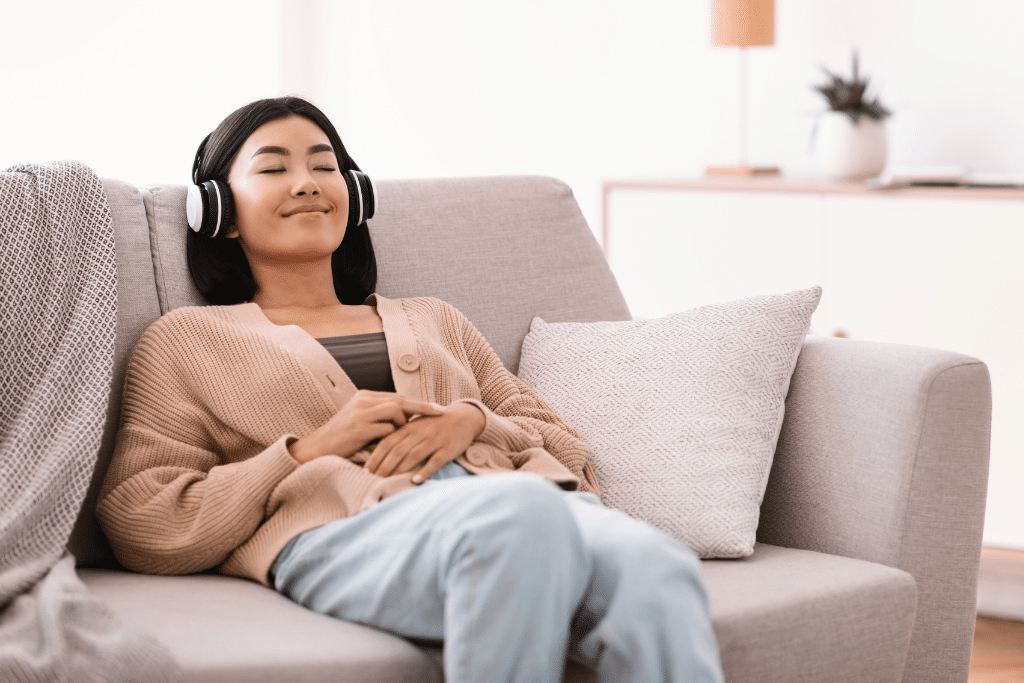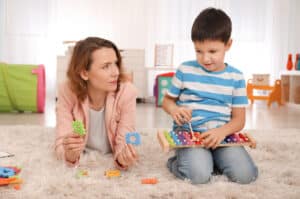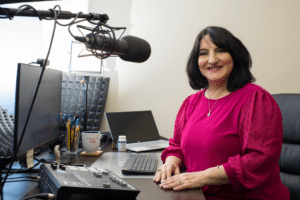Parenting is a journey full of joys and challenges, and when your child is facing mental health issues, the journey can become even more daunting. In these moments, seeking guidance and support is crucial, and that's where the Dr. Roseann podcasts come in.
I love to share my knowledge and experiences as a seasoned therapist and psychologist with parents with children and teens struggling with mental health. I designed the short episodes for parents to gain invaluable insights and advice that I have used to help thousands of children and their families.
From addressing challenging behaviors to better understanding what happens in the brain of a child with ADHD, ASD, OCD, anxiety and so on, this podcast will help parents navigate the complexities of raising children with mental health concerns.
Best Dr. Roseann Podcasts about Parenting
Each podcast for parenting below is an invaluable resource for navigating the complex terrain of raising children with mental health and behavioral challenges. They are designed to provide guidance and support to empower you as parents to nurture your child's emotional well-being.
Here are Some of Dr. Rosean’s Best Podcasts for Parents:
Episode 179: Parenting Neurodivergent: Helping Your Child Be a Successful Adult with Zhara Astra
Listen to this parenting podcast
In this podcast for moms featuring Zhara Astra, a filmmaker, professor, and advocate for neurodiversity, autism, and ADHD, we discussed challenges, triumphs, and essential tips for supporting neurodivergent children on their journey to adulthood.
Zhara reflects on her journey of realizing being neurodivergent while navigating her son's autism and oppositional defiant disorder diagnosis. Despite initial resistance, she embraced neurodivergence after introspection, sharing her lifelong hypersensitivity and feeling misunderstood.
She emphasized the importance of supportive environments and friendships. She talked about the social struggles neurodivergent children face due to intense interests and communication barriers and advocated for compassionate support and inclusive communities.
Zhara also shares strategies for parenting neurodivergent children, emphasizing self-regulation, empathy, and understanding. Through her advocacy work and personal experiences, she championed neurodiversity, challenged stereotypes, and fostered acceptance and support for individuals across the spectrum.
Episode 108: Is Negativity Affecting Your Parenting?
Listen to this parenting podcast
This podcast for parenting explores how past experiences shape parenting skills, mainly focusing on the impact of negativity. Many parents inadvertently adopt a disciplinary model, constantly pointing out their children's mistakes, which can lead to feelings of criticism and low self-esteem.
This negativity bias, stemming from our evolutionary past, makes it challenging to see the positive aspects of parenting, especially when dealing with neurodivergent or mentally challenged children.
However, modern parenting emphasizes compassion, empathy, and positive reinforcement to create strong emotional connections with children and foster healthy self-regulation. Parents must recognize and address negative patterns stemming from their upbringing, as these can influence their subconscious behaviors and reactions.
Fostering a positive attitude and removing negativity bias allows parents to create a healthier, more supportive environment for their children and promote overall well-being and positive parent-child relationships.
Episode 99: Ways to Cultivate Flexibility in Kids: Parenting Hacks
Listen to this parenting podcast
Explore strategies for cultivating flexibility in children using parenting hacks to promote adaptability and resilience. This is my best parent podcast. I discussed the importance of fostering flexibility in today's rapidly changing world and shared practical tips for parents to incorporate into their daily routines.
I also emphasized the significance of modeling flexibility and problem-solving skills for children and highlighted the role of positive reinforcement and consistency in promoting adaptive behavior.
Implementing structured routines, encouraging open communication, and embracing mistakes as learning opportunities are just a few ways to help parents nurture flexibility in their children. Fostering a supportive and empowering environment helps parents develop flexibility and resilience in children to navigate life's challenges with confidence and optimism.
Episode 88: Overcoming OCD: A Therapist’s Perspective on Parenting with Michele Bernal
Listen to this parenting podcast
In this podcast for parenting, I discuss Obsessive-Compulsive Disorder (OCD) and the common mistakes parents make in treating it, joined by lead OCD therapist Michele Bernal. We highlight how OCD affects all aspects of a child’s life, emphasizing its intrusive thoughts and rituals that often go unnoticed.
We address the misdiagnosis of OCD, often overshadowed by anxiety, depression, or ADHD, and stress the importance of accurate diagnosis through brain mapping. Michele advocates for mindfulness-based skills to combat OCD, urging parents not to accommodate the disorder and providing tools to help children manage their thoughts and behaviors.
The importance of exposure response prevention (ERP) is emphasized, alongside creating a supportive family environment to facilitate progress and overcome challenges in OCD treatment. Through understanding, commitment, and a supportive system, families can navigate the journey of overcoming OCD together, leading to transformative results in managing the disorder.
Episode 68: Calm Brain Parenting Brain Hacks
Listen to this parenting podcast
I also consider this episode one of my best podcasts for moms. Here, I focused on the crucial role of parenting in calming a child's brain amidst the increasing stressors impacting children's mental health. I highlighted the necessity of creating a nurturing environment and teaching coping mechanisms to support children's emotional regulation.
I addressed the challenges of dealing with a dysregulated child, emphasizing the importance of proactive strategies instead of reactive responses. Also, I explained the differences between overstimulated and understimulated behaviors and urged parents to find a balance to effectively support their child's mental well-being.
She emphasizes the significance of self-regulation for parents, as children co-regulate with their caregivers. Practical parenting hacks are shared, including prioritizing sleep and physical health. Incorporating magnesium supplementation to support mental well-being also helps.
These Dr. Roseann podcasts offer invaluable resources for parents navigating the complex terrain of raising children with mental health challenges. With her wealth of experience and compassionate approach, Dr. Roseann provides guidance and support that empowers parents to nurture their children's emotional well-being.
So, if you're a parent seeking expert advice and encouragement, tune in to these parenting podcasts and start on a journey of growth and resilience with your child. Remember, you're not alone on this path, and with the proper support, you can navigate any challenge that comes your way. Listen to every Dr. Roseann podcast here.
Dr. Roseann is a mental health expert in Parenting Neurodivergent Children and Teens who frequently is in the media:
- Seeme & Liz 12 Essential Parenting Tips For Kids with ADHD
- Sparking Wholeness (Audio) Parenting Anxious Kids
- Coronavirus with Saul Podcast Parenting when Sheltering in Place
Always remember… “Calm Brain, Happy Family™”
Disclaimer: This article is not intended to give health advice and it is recommended to consult with a physician before beginning any new wellness regime. *The effectiveness of diagnosis and treatment vary by patient and condition. Dr. Roseann Capanna-Hodge, LLC does not guarantee certain results.
Are you looking for SOLUTIONS for your struggling child or teen?
Dr. Roseann and her team are all about science-backed solutions, so you are in the right place!
Unlock Your Child’s Behavior, Attention, and Learning With Science-Backed Solutions
Dr. Roseann is a Children’s Mental Health Expert and Licensed Therapist who has been featured in/on hundreds of media outlets including The Mel Robbins Show, CBS, NBC, PIX11 NYC, Today, FORBES, CNN, The New York Times, The Washington Post, Business Insider, Women’s Day, Healthline, CNET, Parade Magazine and PARENTS. FORBES called her, “A thought leader in children’s mental health.”

She coined the terms, “Re-entry panic syndrome” and “eco-anxiety” and is a frequent contributor to media on mental health.
Dr. Roseann Capanna-Hodge has three decades of experience in working with children, teens and their families with attention-deficit hyperactivity disorder (ADHD), autism, concussion, dyslexia and learning disability, anxiety, Obsessive Compulsive Disorder (OCD), depression and mood disorder, Lyme Disease, and PANS/PANDAS using science-backed natural mental health solutions such as supplements, magnesium, nutrition, QEEG Brain maps, neurofeedback, PEMF, psychotherapy and other non-medication approaches.
She is the author of three bestselling books, It’s Gonna Be OK!: Proven Ways to Improve Your Child's Mental Health, The Teletherapy Toolkit, and Brain Under Attack. Dr. Roseann is known for offering a message of hope through science-endorsed methods that promote a calm brain.
Her trademarked BrainBehaviorResetⓇ Program and It’s Gonna be OK!Ⓡ Podcast has been a cornerstone for thousands of parents facing mental health, behavioral or neurodevelopmental challenges.
She is the founder and director of The Global Institute of Children’s Mental Health, Neurotastic™Brain Formulas and Dr. Roseann Capanna-Hodge, LLC. Dr. Roseann is a Board Certified Neurofeedback (BCN) Practitioner, a Board Member of the Northeast Region Biofeedback Society (NRBS), Certified Integrative Mental Health Professional (CIMHP) and an Amen Clinic Certified Brain Health Coach. She is also a member of The International Lyme Disease and Associated Disease Society (ILADS), The American Psychological Association (APA), Anxiety and Depression Association of America (ADAA) National Association of School Psychologists (NASP), International OCD Foundation (IOCDF).
© Roseann-Capanna-Hodge, LLC 2024










